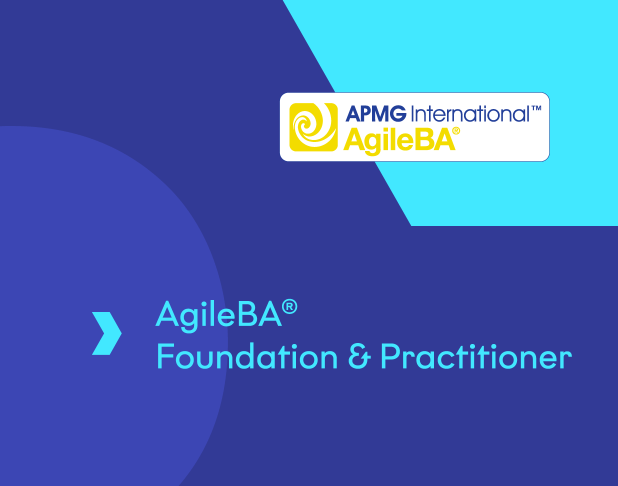The AgileBA Foundation & Practitioner certification guides you through foundational skills and practical application techniques, demonstrating that you have the skills needed to be an effective business analyst working in an agile project team.
New Year, New You! Up to 25% off all training courses – use code: NYNY25USA2
AgileBA® Foundation & Practitioner
Select your learning method:
Please complete the form to ensure your quote is accurate and we will contact you soon.

Implement effective business analysis in your Agile projects with AgileBA Foundation & Practitioner
The AgileBA Foundation & Practitioner course equips you with the skills to excel as an Agile business analyst. Gain a deep understanding of Agile principles, tools, and techniques to analyse business needs effectively. This course enhances your awareness, sharpens your understanding, and supports your professional development in Agile environments.
By the end of the course, you will:
- Understand Agile philosophy and principles in business analysis
- Recognise processes within Agile projects and their configurations
- Identify Agile project products and their purposes
- Understand Agile practices, including their benefits and limitations
- Identify roles and responsibilities in an Agile project
- Apply DSDM principles to Agile project scenarios
- Configure Agile processes for specific project situations
- Produce and evaluate Agile BA products in scenarios
- Apply key practices such as MoSCoW and Timeboxing in projects
- Test, estimate, and prioritise requirements within Agile effectively
What you'll learn
On the course, you’ll gain skills to help you excel as an Agile Business Analyst, including mastering requirements management, facilitating effective collaboration, and applying Agile principles in real-world projects. Learn how to support Agile teams through timeboxing, iterative development, and adaptive planning, ensuring projects align with business goals.
The Agile business case
Learn how to develop an Agile business case that effectively captures project value, goals and benefits in a flexible format. You’ll explore how an Agile business case differs from traditional approaches, focusing on justifying and adjusting project scope based on real-time feedback and evolving priorities to ensure the business case remains relevant and guides decision making.
Prioritisation and modelling
The course covers essential prioritisation techniques, such as MosCow, which allows Agile teams to rank requirements by importance and urgency. You will also learn various modelling techniques that help visualise requirements, processes, and workflows, enabling clear communication and shared understanding among stakeholders and team members.
The requirements lifecycle in an Agile project
Gain a thorough understanding of the requirements lifecycle in Agile projects, from capturing initial requirements to refining and adjusting them through continuous collaboration and feedback. The course teaches you how to manage requirements flexibly, aligning them with iterative development cycles to accommodate change and deliver value incrementally.
- Accredited AgileBA Foundation and Practitioner training
- AgileBA Foundation and Practitioner exams
- Official AgileBA handbook
- Tutor support
- Further optional extras, including Pass Protect, available at checkout
FAQs
This globally recognised AgileBA Foundation & Practitioner certification enhances your expertise, making you a valuable asset in any Agile project team.
How are the AgileBA Foundation and Practitioner exams structured?
The Foundation exam is multiple choice and closed book. You will have 40 minutes to answer 50 questions and must score 25 out of 50 marks to pass (50%).
The Practitioner exam is complex multiple choice and open book (official AgileBA handbook only). The exam lasts 2 and a half hours in which time you must answer 4 questions, worth 20 marks each. A score of 40 marks out of 80 is required to pass (50%).
What is MoSCoW?
MoSCoW is a prioritisation technique commonly used in Agile project management and business analysis to help teams categorise requirements or tasks based on their importance and urgency. It stands for:
- Must have: Critical for the project’s success
- Should have: Important but not critical requirements
- Could Have: Desirable but non-essential
- Won’t have: Agreed to be out of scope for the current project
What certification will I receive at the end of my AgileBA Foundation & Practitioner training?
Once you have completed all the training associated with this course, and passed both exams, you will achieve two certifications: AgileBA Foundation and AgileBA Practitioner.
How will the AgileBA Foundation & Practitioner training benefit my career?
As a globally recognised qualification, this course will equip you will sought-after skills in Agile business analysis and ensure you are recognised for your expertise in supporting Agile projects, managing requirements, and facilitating good communication. This will put you in a competitive position when applying for any Business Analyst positions that require agility and adaptability.

"Very professional and enjoyable training. Would highly recommend!"

“I thought the tutor was great. They were professional with great and interesting explanations, and they made learning the course content fun. The teaching prepared me well for the exams; I passed on first attempt."
learners